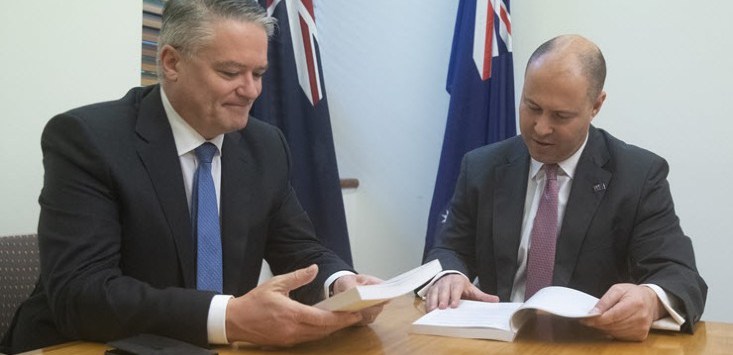
Finance Minister Mathias Cormann and Treasurer Josh Frydenberg look over the 2020 budget. Source: AAP/Mike Bowers.
Treasurer Josh Frydenberg promised a budget that was “all about jobs”, and employment is indeed the theme of the suite of budget measures announced tonight.
For small and medium businesses, this translates to new wage subsidies for hiring young job-seekers and new apprentices, albeit with tight eligibility criteria.
“There is no economic recovery without a jobs recovery,” said the Treasurer during his budget speech tonight.
“There is no budget recovery without a jobs recovery.”
Frydenberg’s goal is to get businesses investing again, in new equipment and machinery, and new jobs.
To this end, the government has announced a massive investment allowance that will enable nearly all Australian businesses (99%, to be exact) to fully write-off all new assets purchased and used by June 2022.
And it will allow businesses with up to $5 billion in annual turnover to carry back losses against profits made last year, in order to claim a refund.
The measure, which already has the support of members of the small business community, will be available to about 1 million companies, which will be able to claim losses in the 2021-22 financial year against profits they made in or after 2018-19.
In the first budget to be handed down amid a recession in almost three decades, the government has also chosen to focus on tax reforms, including the already announced changes to fringe benefits tax and capital gains tax, and bringing forward personal income tax cuts.
And it will be hoping the $800 million it has earmarked for digital services will have the intended effect of reducing red tape for those already in business, and those considering starting a business for the first time.
A discussion about the future of the Australian economy cannot take place without the innovators in our tech community, many of which may be feeling a sense of relief tonight to learn that the government has addressed some of their key concerns with a proposal to change the Research and Development Tax Incentive (RDTI) scheme.
While the government hasn’t scrapped the changes altogether, it has decided to remove the $4 million cap and will no longer be backdating the changes.
The proposed tiered system has also been simplified, which means smaller businesses will be on a flat rate of 18.5%.
Frydenberg says the government’s wide-sweeping investment incentive is a “game-changer” that will “unlock investment”, and he may well be right.
But for businesses that are being weaned off JobKeeper, there’s understandable concern about what happens next.
That’s why key members of the small business community were calling for the government to include a small business viability review program in the budget — a subsidy that would allow small businesses to get tailored plans from accredited professionals to help make decisions about the future of their businesses.
The government’s decision not to include such a program in the budget is a missed opportunity.
Time will tell if its chosen measures will be enough to give these businesses, and the economy, a fighting chance.
NOW READ: Budget 2020: Businesses to fully write-off all assets purchased and used before June 2022


COMMENTS
SmartCompany is committed to hosting lively discussions. Help us keep the conversation useful, interesting and welcoming. We aim to publish comments quickly in the interest of promoting robust conversation, but we’re a small team and we deploy filters to protect against legal risk. Occasionally your comment may be held up while it is being reviewed, but we’re working as fast as we can to keep the conversation rolling.
The SmartCompany comment section is members-only content. Please subscribe to leave a comment.
The SmartCompany comment section is members-only content. Please login to leave a comment.